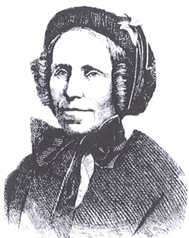Mathilda Foy

Mathilda (or Mathilde) Foy (or Foj), (10 November 1813 – 1 November 1869), was a Swedish philanthropist and writer, known for her charitable work. She is known as a pioneer of the Sunday school, and as the co-founder of the charity organisation "Fruntimmerssällskapet för fångars förbättring" (English: The Women Society for the Improvement of Prisoners) in 1854.
Biography
She was the daughter of the British Consul (representative) in Stockholm, George Foy and his Swedish wife Mathilda Augusta Skoge.[1][2]
In 1851, Foy was, alongside among others Maria Cederschiöld (deaconess), in the board of directors at the newly founded Deaconess Institution, the first one in Sweden, founded that same year in Stockholm[3]
In 1854, she co-founded the "Fruntimmersällskapet för fångars förbättring" together with Fredrika Bremer, Maria Cederschiöld (deaconess), Betty Ehrenborg and Emilia Elmblad. The purpose was to visit female prisoners to provide moral support and improve their character by studies of religion. They were met by resistance among the prisoners authorities, also the prison priest. Betty Ehrenborg took charge of the vagrants, Maria Cederschiöld the thieves and Mathilda Foy the child murderers, while Bremer jumped in where she was needed until Ehrenborg retired, after which she took over the vagrants, among whom she felt very comfortable :.[3][4]Had it not been for the way I was brought up and my social position, I may have had belonged with them. I do not believe I would have murdered my children or any other person, nor would I have stolen, it seemed to me to be so vulgar. But to run along the streets and scream and argue, drink myself intoxicated, use foul language and insult the police; that would have been more in my taste. I would have found that amusing!
Foy wrote several times about the Emilie Petersen, known as "Mormor på Herrestad" (The Herrestad Grandmother), a woman famed for her charitable work institutions on her estate, whom she often visited.
In 1868, Mathilda Foy and Maria Cederschiöld founded a Deaconess institute in Jämtland and Norway.[5]
Works
- 1858–60 redaktör för Christelig månadsskrift för barn, kantorn P. Palmquist förlag (död 1887); diverse bidrag under pseudonym 'Tante Ester'[6]
- 1858 Mormor på Herrestad, 32 s, Utgifven af P. Palmqvist. Sthm
- 1858 Missionsbönerna på Herrestad, 32 s, Utgifven af P. Palmqvist. Sthm
- 1860 Din tid är Herrans! Ett bref från Götheborg af M. F., Utgifven af P. Palmqvist. Sthm, P. P. Elde & c,. [Projekt Runeberg]
- 1865 Alpernas Israel, eller Valdenserna förr och nu / af M.F. [efter Alexis Muston, L’Israel des Alpes, Paris 1852][7]
- 1866 Fru Lawsons hem, af M. F. Utgifwen af P. Palmqvist, Sthm, A. Holmberg & s.,
- 1866 Ingen krona för mig! Bearbetning från franskan af M.F., P. Palmqvist. Sthm, A.Holmberg & c.
Legay
Today, Mathilda Foy is counted among 300 Schwedische Personlichkeiten,[8] she is in Commemoratives of Famous Women,[9] as well as one of "Three names which is often put alongside Frederika Bremer in reference to the Christian charity work of the 1850s" in Sweden alongside Maria Cederschiöld and Betty Ehrenborg[10]
References
- ↑ Gustaf Näsström, Det gamla Medevi, Stockholm 1928, 2/1929, R/1978, kapitel "Mamsell Foy och löjtnant Björnstjerna"
- ↑ http://www.mormor.se/default.aspx?lang=SE&articleId=1929
- ↑ 3.0 3.1 Elisabeth Christiansson, ”Först och framför allt själen” – diakonins tankevärld omkring år 1850: Sköndalsinstitutets Arbetsrapportserie nr 32 http://www.esh.se/fileadmin/erstaskondal/ESH_Gemensamt/Arbetsrapporter/arbetsrapport_32.pdf
- ↑ Lotten Dahlgren, 'Fredrika Bremer bland lösdriverskorna', i Hertha, XVII/1, januari 1930 http://mathilda.new-renaissance.com
- ↑ http://skeptron.uu.se/pers/monicaz-091202/ffo/kapital/cederskiold-marie.html
- ↑ http://www.kb.se/Sverigesperiodiskalitteratur/2/2_319.htm
- ↑ http://sv.wikipedia.org/wiki/Valdenser
- ↑ http://www.schwedisch-translator.de/personen/personen.html
- ↑ http://www.fembio.org
- ↑ Lotten Dahlgren, 'Fredrika Bremer bland lösdriverskorna', i Hertha, XVII/1, januari 1930, Gbg UB serie 'Äldre digitaliserade kvinnotidskrifter' http://www.ub.gu.se/kvinn/digtid/06/1930/hertha1930_1.pdf
|